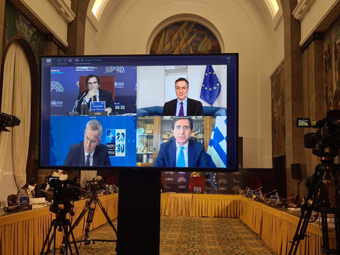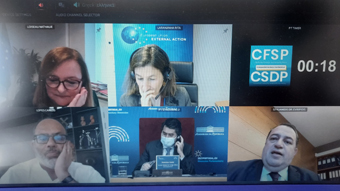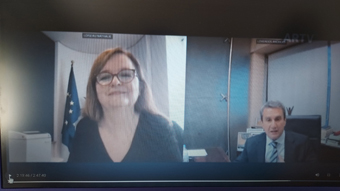Press Office
Athens, 4 March 2021
Inter-Parliamentary Conference on EU's Common Foreign and Security Policy and Common Security and Defence Policy

The inter-parliamentary conference on the Common Foreign and Security Policy and the Common Security and Defence Policy (CFSP/CSDP) concluded today. It was held in Lisbon in the framework of the Portuguese Presidency of the EU Council, on the 3rd and 4th of March. The main topics on the agenda were EU-NATO cooperation, recent developments in the field of CFSP/CSDP, as well as strengthening the EU's cooperation with Africa. The Hellenic Parliament was represented by MPs Konstantinos Gioulekas, Evripidis Stylianidis, Georgios Katrougalos and Andreas Loverdos.
In his intervention on EU-NATO relations, Mr. Gioulekas addressed a question to NATO Secretary General Jens Stoltenberg regarding NATO's intentions towards Turkey, which openly questions the values and principles of its members and EU member states, openly threatening Greece and Cyprus with war, while at the same time demonstrating an unconventional and infringing behaviour, violating sovereign rights of its neighbouring countries, arming its forces with weapons systems by a non-member state. The NATO SG answered that Turkey is an important member of the Alliance, that has contributed substantially to fighting ISIS and that it has suffered more attacks than any other member state. He pointed out that it hosts millions of refugees on its territory. However, he added that there is concern among NATO members, especially after Turkey armed itself with the Russian S400 missile defence system. Mr. Gioulekas raised the issue of Turkish infringing behaviour with the High Representative of the EU, Josep Borrell, adding that the EU's placating policy towards Turkey does not seem to pay off and noted that at the European Council on the 25th of March the EU must impose sanctions on Turkey, should it continue to make provocations and violate International Law.
 Mr. Stylianidis spoke on the strategic EU-NATO relationship, saying that participation in it should be directly linked to the consistency of members meeting their financial obligations to the Alliance and added that Greece did so even during a period of great economic hardship. He stressed that the success of developing a European or Euro-Atlantic security and defence dimension depends on building a community of values, a notion that Turkey does not appear to share, considering it chose to arm itself with the Russian S400 missile defence system, even though it is a NATO member state and it has not respected the common policy on issues such as the arms embargo in Libya and has intervened in conflicts in Syria, Iraq and Nagorno-Karabakh. Regarding EU-Africa relations, Mr. Stylianidis referred to the causes of mass population migration towards the EU, such as climate change, food and drinking water shortages, extreme poverty, local wars and human rights abuses and stressed the urgent need to tackle the root causes of population movements. Therefore, he noted, Greece welcomes the renewed EU interest in developing a Strategic Partnership with Africa.
Mr. Stylianidis spoke on the strategic EU-NATO relationship, saying that participation in it should be directly linked to the consistency of members meeting their financial obligations to the Alliance and added that Greece did so even during a period of great economic hardship. He stressed that the success of developing a European or Euro-Atlantic security and defence dimension depends on building a community of values, a notion that Turkey does not appear to share, considering it chose to arm itself with the Russian S400 missile defence system, even though it is a NATO member state and it has not respected the common policy on issues such as the arms embargo in Libya and has intervened in conflicts in Syria, Iraq and Nagorno-Karabakh. Regarding EU-Africa relations, Mr. Stylianidis referred to the causes of mass population migration towards the EU, such as climate change, food and drinking water shortages, extreme poverty, local wars and human rights abuses and stressed the urgent need to tackle the root causes of population movements. Therefore, he noted, Greece welcomes the renewed EU interest in developing a Strategic Partnership with Africa.
 In his intervention, Mr. Loverdos referred to the interoperability between the EU and NATO and the significance thereof, especially during times of crisis, such as the evolving pandemic, and added that a good example of interoperability is the Alliance's participation in PESCO and the renewed US interest in it. Lastly, he addressed the Portuguese Foreign Minister, Augusto Santos Silva, asking to know if other actions are being planned in this direction.
In his intervention, Mr. Loverdos referred to the interoperability between the EU and NATO and the significance thereof, especially during times of crisis, such as the evolving pandemic, and added that a good example of interoperability is the Alliance's participation in PESCO and the renewed US interest in it. Lastly, he addressed the Portuguese Foreign Minister, Augusto Santos Silva, asking to know if other actions are being planned in this direction.
High resolution images
Back